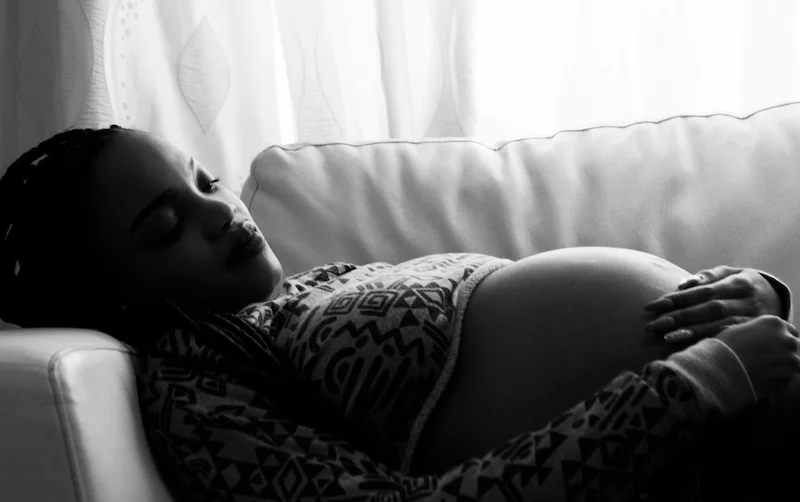Month 6: Growing Strong
Weeks 23-27 of Pregnancy

As you complete your sixth month, you are approaching the end of the second trimester. This month marks an important milestone - by week 24, your baby reaches "viability," meaning they have a chance of survival if born prematurely. Your baby's movements are now strong and regular, creating a wonderful daily connection between you both.
What is Happening This Month
Month 6 brings rapid growth for your baby, who is becoming increasingly responsive to the world outside the womb. You might notice your baby responding to loud noises, bright lights, and even your partner's voice. Many women find this month particularly enjoyable as they still feel relatively comfortable while experiencing the joy of strong, regular movements.
Week-by-Week Development
Baby's hearing is well-established. Blood vessels in the lungs develop to prepare for breathing.
Viability milestone! Baby's lungs produce surfactant, to help with the lungs development. Brain waves similar to a newborn's can be detected.
Baby's hands are fully developed with fingernails. The nostrils begin to open, and baby practises breathing movements.
Baby's eyes open for the first time! The immune system is developing as baby receives antibodies from you.
Brain tissue continues rapid development. Baby has regular sleep and wake cycles, often opposite to yours!
Your Baby's Development
By the end of month 6, your baby has grown to about the size of an ear of corn (30-33cm) and weighs approximately 600-700 grams. Significant developments include:
- Lungs are developing rapidly, with airways branching out
- Baby's skin is still thin and translucent but beginning to thicken
- Fat deposits are forming, giving baby a less wrinkled appearance
- Eyes can open and close, and baby may blink in response to bright lights
- Brain development accelerates - baby can now dream during REM sleep
- Fingernails have grown to fingertip length
- Baby has developed a regular sleep-wake cycle (often opposite to yours!)
- The inner ear is fully developed, improving balance and coordination
- Baby practises breathing movements, inhaling amniotic fluid
Size Comparison
Your baby is about the size of an ear of corn
30-33 cm (12-13 inches) | 600-700gChanges in Your Body
As your baby grows rapidly, your body continues adapting to accommodate this growth. The sixth month often brings new physical sensations and changes:
Swollen Feet
Increased fluid retention causes puffy ankles and feet, especially by the end of the day
Stretch Marks
Skin stretching may cause pink or purple lines on your belly and breasts
Braxton Hicks
Practice contractions that feel like tightening of the uterus
Hot Flashes
Increased metabolism and blood flow cause feeling overheated
Bleeding Gums and Nose
Pregnancy hormones make gums and your nose more sensitive and prone to bleeding
Dizziness
Blood pressure changes can cause light-headedness when standing
Important Care Tips
Movement Monitoring
Your baby should be active daily by now. Get familiar with your baby's pattern - some are morning exercisers, others are night owls! From week 24, you should feel movements every day. If you notice reduced movement, do not wait - contact your midwife, GP or Obstetrician immediately for reassurance.
Glucose Tolerance Test
Between weeks 24-28, you will be offered a glucose tolerance test (GTT) for gestational diabetes. This involves drinking a glucose solution and having blood tests taken at intervals. Some women may need the longer 3-hour test if the initial screening shows elevated levels. Follow any fasting instructions given by your healthcare provider.
Hydration & Swelling
Combat swelling by drinking plenty of water, elevating your feet when possible, and avoiding standing for long periods. Compression socks/stockings can help with ankle swelling. Remove rings if fingers are swelling. Sudden or severe swelling in face and hands (sometimes even overnight) needs immediate medical attention.
Birth Preparation
Start thinking about your birth preferences. Research pain relief options, birth positions, birth units, and who you'd like as birth partners. While staying flexible is important, having preferences helps you feel more prepared and in control. Consider writing a birth plan to discuss with your midwife or Obstetrician.
When to Contact Your Midwife, GP or Obstetrician
As you near the third trimester, staying alert to warning signs becomes increasingly important. Contact a healthcare professional immediately if you experience:
- Reduced or absent baby movements
- Regular contractions (more than 3 per hour) before 37 weeks
- Vaginal bleeding or fluid leakage
- Severe headaches with vision changes or upper abdominal pain
- Sudden swelling of face, hands, or feet
- Persistent vomiting or inability to keep fluids down
- Leg calf tenderness, redness, or swelling
- Severe shortness of breath or chest pain
Looking Ahead
As you prepare to enter the third trimester, you are in the home stretch! Month 7 begins the final phase of your pregnancy journey. Your baby will continue gaining weight rapidly, and you will have more frequent antenatal appointments. Many women start experiencing nesting instincts around this time. You will typically have your next routine appointment around 28 weeks to begin third trimester monitoring. Remember to pace yourself and ask for help when needed. You are doing an incredible job growing your baby!
